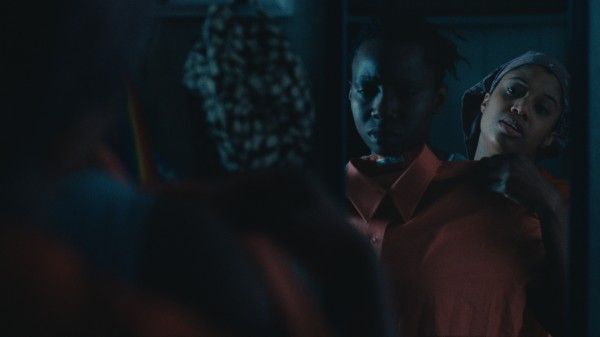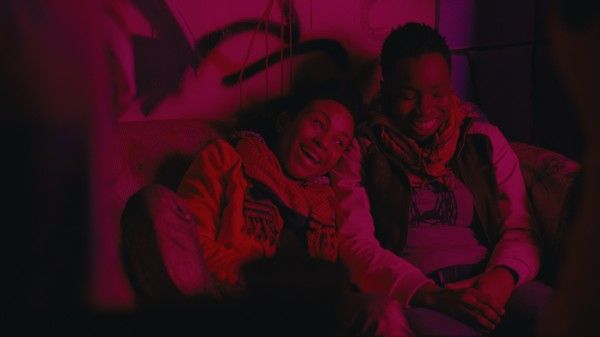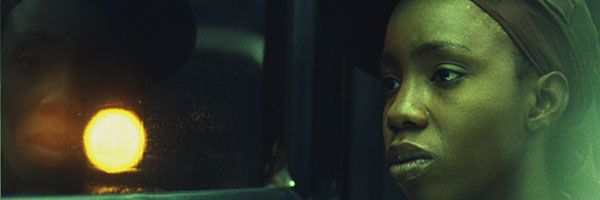I cannot personally speak to the experience of hiding my sexuality from my loved ones. Since I’m heterosexual, people have had to work a little harder to find reasons to irrationally hate me. It’s difficult to outright dismiss films which explore the difficulties homosexuals, especially homosexual teens, face when they live in environments which are opposed and sometimes openly hostile to their sexuality. However, we’ve seen this story so many times, not just in film, but in other art forms as well, that it has made the gay experience seem like one of agony, as if this is the only story gays and lesbians have to tell. Dee Rees’ Pariah approaches the story of a black teenage lesbian with enough heart, honesty, and tremendous performances, especially from lead actress Adepero Oduye, but it never completely manages to break free or redefine its sub-genre.Alike (pronounced Ah-lee-kay and played by Oduye) is a middle-class black teenager who is hiding her homosexuality from her parents. Her religious, overbearing mother Audrey (Kim Wayans) wants to control the 17-year-old right down to choosing her clothes and her friends. Her father Arthur (Charles Parnell) dotes on Alike but his long hours working as a detective is causing tension in his marriage and creating distance from his children. Confiding only in her lesbian best friend Laura (Pernell Walker), Alike does her best to hide her true self from her parents but is also looking to make a romantic emotional connection with another teenage lesbian. Rees, who makes her feature debut with Pariah, twists the agonizing-gay-teen story enough to make it feel fresh. She paints an authentic family dynamic where we can see that Alike is like her father but her younger sister is more like their mother. It’s also fulfilling to see a movie about a black family that has both parents, is middle-class, and wasn’t directed by Tyler Perry. Additionally, Alike’s preference of music (and therefore the film’s soundtrack) isn’t predictable hip-hop or R&B but underground rock. Rees has a smart awareness of the staples of an African-American-centric movie and decides to throw them out because the conventional household dynamic and music isn’t representative of the diversity among African-Americans and their families.The story is also helped by outstanding work from the majority of the cast. Oduye gives a breakout performance as Alike, playing the character with honesty and restraint. She brings a sweetness and naivety to Alike that makes the character’s struggle more compelling. We see that Alike isn’t just struggling with hiding her identity from her parents. She also wants to find a girlfriend even though Laura thinks that Alike should just give up her virginity and hook up with someone at the club. Oddly, the film tries to set up a side-story for Laura’s life, but it’s too thin and doesn’t have enough thematic parallels to Alike’s story to justify its inclusion despite Walker’s strong performance. The only cast member who comes up short is Wayans who makes Audrey come off more shrill than sympathetic.
Rees, who makes her feature debut with Pariah, twists the agonizing-gay-teen story enough to make it feel fresh. She paints an authentic family dynamic where we can see that Alike is like her father but her younger sister is more like their mother. It’s also fulfilling to see a movie about a black family that has both parents, is middle-class, and wasn’t directed by Tyler Perry. Additionally, Alike’s preference of music (and therefore the film’s soundtrack) isn’t predictable hip-hop or R&B but underground rock. Rees has a smart awareness of the staples of an African-American-centric movie and decides to throw them out because the conventional household dynamic and music isn’t representative of the diversity among African-Americans and their families.The story is also helped by outstanding work from the majority of the cast. Oduye gives a breakout performance as Alike, playing the character with honesty and restraint. She brings a sweetness and naivety to Alike that makes the character’s struggle more compelling. We see that Alike isn’t just struggling with hiding her identity from her parents. She also wants to find a girlfriend even though Laura thinks that Alike should just give up her virginity and hook up with someone at the club. Oddly, the film tries to set up a side-story for Laura’s life, but it’s too thin and doesn’t have enough thematic parallels to Alike’s story to justify its inclusion despite Walker’s strong performance. The only cast member who comes up short is Wayans who makes Audrey come off more shrill than sympathetic. While Pariah is able to find its own voice, it eventually falls into the same traps as many other films with leading character who are closeted homosexuals. The movie doesn’t feel dishonest and Rees does a fine job showing restraint for the majority of the picture, but eventually she has to pull the trigger on Alike coming out to her parents. Pariah does a fine job of finding the tension and sadness of Alike’s closeted homosexuality, but when she finally comes out, the scene plays out melodramatically. Rees then compounds the problem with a truly awful line of dialogue that’s repeated twice so you’ll get the message. For a movie that treats its audience with great respect through the majority of its runtime, the ending is uncomfortably corny.With her debut feature film, Dee Rees has established herself as a filmmaker with great promise and potential. At Sundance, I was hearing some folks compare Pariah to Precious: Based on the Novel “Push†by Sapphire, but there are only three comparisons that are true: 1) Both films feature a black teenage protagonist; 2) Both films premiered at Sundance; and 3) Both films made me deeply care about characters and a lifestyle that were complete foreign to my personal experience. Pariah isn’t without its faults, but until the ending, it’s a rich, honest portrayal of an individual that transcends the pitfalls of agonizing-homosexual sub-genre.Rating: B-For all of our coverage of the 2011 Sundance Film Festival, click here. Also, here are links to all of my Sundance reviews so far:
While Pariah is able to find its own voice, it eventually falls into the same traps as many other films with leading character who are closeted homosexuals. The movie doesn’t feel dishonest and Rees does a fine job showing restraint for the majority of the picture, but eventually she has to pull the trigger on Alike coming out to her parents. Pariah does a fine job of finding the tension and sadness of Alike’s closeted homosexuality, but when she finally comes out, the scene plays out melodramatically. Rees then compounds the problem with a truly awful line of dialogue that’s repeated twice so you’ll get the message. For a movie that treats its audience with great respect through the majority of its runtime, the ending is uncomfortably corny.With her debut feature film, Dee Rees has established herself as a filmmaker with great promise and potential. At Sundance, I was hearing some folks compare Pariah to Precious: Based on the Novel “Push†by Sapphire, but there are only three comparisons that are true: 1) Both films feature a black teenage protagonist; 2) Both films premiered at Sundance; and 3) Both films made me deeply care about characters and a lifestyle that were complete foreign to my personal experience. Pariah isn’t without its faults, but until the ending, it’s a rich, honest portrayal of an individual that transcends the pitfalls of agonizing-homosexual sub-genre.Rating: B-For all of our coverage of the 2011 Sundance Film Festival, click here. Also, here are links to all of my Sundance reviews so far:
- Being Elmo: A Puppeteer’s Journey
- Benavides Born
- Bobby Fischer Against the World
- Corman’s World: Exploits of a Hollywood Rebel
- The Details
- The Future
- The Greatest Movie Ever Sold
- Higher Ground
- Hobo with a Shotgun
- Homework
- How to Die in Oregon
- In a Better World
- The Interrupters
- The Lie
- Like Crazy
- Magic Trip
- Martha Marcy May Marlene
- The Music Never Stopped
- My Idiot Brother
- Page One: A Year Inside the New York Times
- Project Nim
- Reagan
- Red State
- Salvation Boulevard
- Submarine
- Take Shelter
- These Amazing Shadows
- Tyrannosaur
- Win Win

